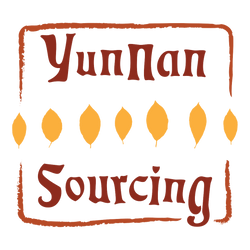
2009 Ginseng Aroma Te Ji Grade Liu Bao Tea
This is a 2009 Ginseng Aroma Liu Bao Tea that was aged in Wuzhou (Guangxi). The Ginseng Aroma is not something that the tea started with, but rather comes about during the aging/storage process after several years.
I asked the supplier of this tea to explain "Ginseng Aroma" in Liu Bao tea.
So, in what kind of Liu Bao tea does the "ginseng aroma" appear? How can we determine when a particular Liu Bao tea will develop this aroma? We know that Liu Bao tea can have honey, fungal, date, woody, pine smoke, ginseng, medicinal, and betel nut aromas. Some also say that Liu Bao tea can develop an aged aroma. Among these aromas, the honey aroma is typically found in newer traditional Liu Bao teas, while the other seven aromas are aged aromas, which develop as the tea ages, in contrast to fresher aromas. Among these aged aromas, fungal, date, woody, and pine smoke aromas generally develop within the first six years of aging. The ginseng, medicinal, and betel nut aromas typically appear after more than six years of aging. In my experience, the aging path of aromas for modern Liu Bao tea tends to follow this sequence: fungal, date, woody, ginseng, and then medicinal. I exclude the betel nut aroma from modern Liu Bao tea because the typical aroma transition for traditional Liu Bao tea is honey, pine smoke, medicinal, and then betel nut. The betel nut aroma is a varietal aroma specific to certain types of Liu Bao tea.
For modern Liu Bao tea, there are usually two common paths for aroma development. One path is fungal to woody to medicinal, and the other is date to ginseng to medicinal. Generally, heavily fermented teas follow the first path, while lightly fermented Liu Bao teas follow the second path. Therefore, the ginseng aroma usually appears in modern Liu Bao teas that are lightly fermented and have aged for over eight years. Not all Liu Bao teas will develop a ginseng aroma. In fact, the ginseng aroma is also related to the tea variety. If the tea is not made from the Guangxi large-leaf variety (Guiqing variety), even if it is lightly fermented, it will not develop a ginseng aroma. Similarly, the Guiqing variety will not develop a betel nut aroma even if it is processed using traditional methods. Both paths can result in a medicinal aroma, but it is not the same type of medicinal aroma. For example, the "Old Tea Granny" from the traditional process also has a medicinal aroma, but it is not the same type. The medicinal aroma also has different types.
Will traditionally processed Liu Bao tea made from Guangxi large-leaf (Guiqing variety) develop a ginseng aroma?
The answer is yes, but not all traditionally processed Guangxi large-leaf teas will have a ginseng aroma. The specific reasons for this are not detailed here, as that is a highly valuable answer.
Therefore, the ginseng aroma can be considered a varietal aroma of the Guangxi large-leaf variety from a specific region, appearing in both modern and traditional processing methods. In modern processes, it appears in Liu Bao teas that have aged for more than eight years. In traditional processes, it typically takes longer, generally appearing in Liu Bao teas that have aged for over twelve years.
- 500 Grams per basket. Each basket comes in a cardboard box to protect it.
- If you order less than 500 Grams the tea will come in our standard resealable pouch.






















